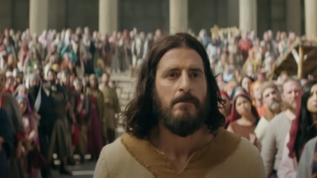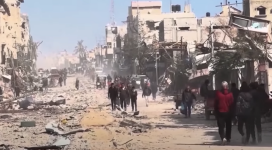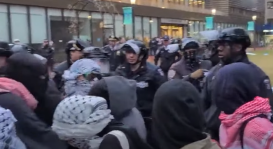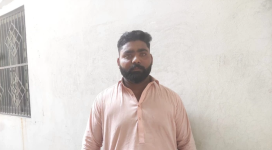WASHINGTON D.C. -- Sixteen leaders of the historic African-American churches gathered with the Rev. Dr Samuel Kobia, head of the World Council of Churches, to discuss the HIV/AIDS pandemic, peace processes and reconstruction in Africa, the role of the United States as the only global superpower, ecumenical challenges and the 2004 Decade to Overcome Violence focus on the United States, March 8, 2004.
“The scourge of AIDS is devastating communities, ripping apart the social fabric and having dire economic consequences,” Kobia began. “But it is not an 'African problem' and it is not affecting 'someone else'. It is killing our brothers and sisters, our parents and pastors.”
"We must do our part,” he urged, “and that begins with being informed and sharing the facts. But it also means the commitment of our churches to speaking the truth, acting with compassion, and challenging our governments to fulfill their moral obligations in the face of millions of unnecessary deaths each year.”
The gathering, which took place at the National Press Club in Washington DC, was attended by representatives of the African Methodist Episcopal, African Methodist Episcopal Zion, Christian Methodist Episcopal, National Baptist Convention of America, National Baptist Convention USA, Progressive National Baptist Convention, and the Black Churches' Liaison Committee.
Kobia praised these churches for being "in the forefront of planning and of launching the Decade to Overcome Violence (DOV) in the United States," and encouraged a greater involvement from the churches in bringing about a change.
"If the Decade is to be more than a nice slogan and a pile of meeting reports, it will depend on your churches and on your leadership," he said.
Kobia also addressed "The challenge of living in a world with one dominant superpower.”
"As an African, I can understand the anger that so many ordinary people feel at the arrogance" of the US administration, he added.
"US churches, including African-American churches, have a heavy responsibility" that goes beyond their borders. "We know you are working to confront your government. We want to be supportive of your efforts and to encourage you to do more," he said.
In terms of the facing the challenges by the ecumenical movement, Kobia said there was a need to find ways to prepare the next generaltion of ecumenical leadership, at the face of a growth of denominationalism and decline of ecumenical support.
He challenged the gathering to find ways in which the African-American churches "could not only be active in the ecumenical movement but could assume a position of leadership".
The event was hosted by the African-American members of the WCC's central committee: Bishop McKinley Young, Rev. Dr Angelique Walker-Smith, Rev. Dr Staccato Powell, and Rev. Dr Tyrone Pitts.
The following representatives of the historic African-American churches participated in the 8 March meeting in Washington DC with the WCC general secretary:
African Methodist Episcopal Church
Bishop Vinton R. Anderson
African Methodist Episcopal Zion Church
Presiding Bishop George W. Walker, Sr.
Bishop Clarence Carr
Bishop Milton A. Williams
Rev. Dr. Staccato Powell
Christian Methodist Episcopal Church
Presiding Senior Bishop Marshall Gilmore
Presiding Bishop Paul A.G. Stewart
Bishop Thomas L. Hoyt, Jr.
National Baptist Convention of America
Bishop G. J. West
National Baptist Convention USA
Rev. Dr. William J. Shaw
Rev. Dr. Angelique Walker-Smith
Rev. Dr Robert Scott Jones
Rev. Dr J. Wendall Mapson, III
Progressive National Baptist Convention
Rev. Dr. Major L. Jemison
Rev. Dr. Tyrone Pitts
Rev. Dr John Mendez







